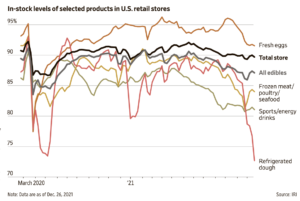Congress has quickly engaged in putting together potential aid packages for farmers that would more than double the Trump administration's $12 billion under the Farmer Bridge Assistance (FBA) Program.
WSJ: Omicron Brings Renewed Strain to U.S. Food System
Jesse Newman and Jaewon Kang reported on the front page of Monday’s Wall Street Journal that, “The U.S. food system is under renewed strain as Covid-19’s Omicron variant stretches workforces from processing plants to grocery stores, leaving gaps on supermarket shelves.

“In Arizona, one in 10 processing plant and distribution workers at a major produce company were recently out sick. In Massachusetts, employee illnesses have slowed the flow of fish to supermarkets and restaurants. A grocery chain in the U.S. Southeast had to hire temporary workers after roughly one-third of employees at its distribution centers fell ill.
Food-industry executives and analysts warn that the situation could persist for weeks or months, even as the current wave of Covid-19 infections eases. Recent virus-related absences among workers have added to continuing supply and transportation disruptions, keeping some foods scarce.
Newman and Kang explained that, “Nearly two years ago, Covid-19 lockdowns drove a surge in grocery buying that cleared store shelves of products such as meat, baking ingredients and paper goods.
“Now some executives say supply challenges are worse than ever. The lack of workers leaves a broader range of products in short supply, food-industry executives said, with availability sometimes changing daily.
“Supermarket operators and food makers say that overall supplies are ample, despite the continuing labor shortages and difficulties transporting goods. They say that shoppers will find what they are looking for, but may have to opt for different brands.”
The Journal article added that, “The Agriculture Department showed cattle slaughter and beef production over the week of Jan. 14 were down about 5% from a year earlier, with hog slaughtering down 9%. Chicken processing was about 4% lower over the week ending Jan. 8, the USDA said. Labor shortages are also affecting milk processing and cheese production, according to the agency.
“Because it often takes weeks for meat to reach store shelves from the plants, the current Omicron-related labor problems at producers could prolong supply issues, said Christine McCracken, executive director of meat research at agricultural lender Rabobank. ‘This might mean less meat for longer,’ she said.”





